- Home
- Christie Golden
The Shattering Page 16
The Shattering Read online
Page 16
Gentle as the words were, it was a summons that Aggra hastened to obey. She had come to the Throne of the Elements to sit quietly at the feet of the great Elemental Furies—Aborius, Gordawg, Kalandrios, and Incineratus—in the hope that perhaps today they would speak to her. She had barely settled down near Kalandrios, the Fury of Air, when Geyah’s words had come to her. So now she was heading back toward Garadar, the Horde fortress in this land of Nagrand, to hear the news that was so important it could not wait.
Aggra was a shaman, but as fit, healthy, and strong as most warriors. She was therefore only slightly out of breath from her exertion when she entered the building atop the highest rise of Garadar and dropped to her knees in front of the Greatmother, her head respectfully lowered.
“The wind bade me come, Greatmother. What is the news?”
Geyah smiled and patted the threadbare rug. Aggra moved to sit beside her. Geyah touched the younger orc’s face gently. “So prompt. Perhaps the wind let you fly, eh?”
Aggra chuckled and leaned into the gnarled hand. “No, but the water spirits let me run over the lake.”
Geyah laughed. “That was kind of them. As to my news, I have just heard from my grandson … and he wishes to come here to Nagrand, to learn what I have to teach.”
Aggra blinked. “He … what? Go’el?”
“Yes, Go’el.”
Aggra frowned. “Does he still go by that hateful slave name?”
“He does,” Geyah said, unperturbed by Aggra’s seeming rudeness. Aggra knew Geyah had realized long ago that it was easier to direct the elements to help one than it was to curb Aggra’s sharp tongue. “And that is his choice. Perhaps you can ask him why he so chooses when he arrives.”
“Perhaps I will,” Aggra agreed readily. She had never met the famous Thrall, as she had been away from Nagrand when he had come once before. All she knew of him was what others had told her. Now it seemed she would get the chance to make up her own mind about him. “I did not think he would ever return.”
“Nor I, save to bid me farewell when it is my time to join the ancestors,” Geyah said. “He has asked for my help.”
“Help? What does the oh-so-powerful Thrall need help with?”
“Healing his world.”
Aggra fell silent. “He tells me in this letter that the elements are distressed in Azeroth, and he seeks my wisdom,” continued Geyah. “He says that if anyone understands how to work with a world in turmoil, it is I.”
“Hmph,” sniffed Aggra. She was embarrassed by her earlier comments but was trying not to show it. “The green fellow does have wisdom in him, for all his humanlike ways.”
Geyah laughed, a cheerful cackle. “I look forward to seeing the two of you meet,” she said. “But he is not quite correct.”
“What do you mean? Greatmother, you have more wisdom than the rest of us combined. You have seen so much more.”
Geyah laid a hand on the girl’s smooth, brown arm. “I have seen more, yes. And I know much, yes. But there is someone who might understand such things even better than I.”
Aggra cocked her head in a confused look. “Who?”
“You, child.”
The brown eyes flew open wide. “Me? Oh, no. I know some, but—”
“Never have I seen a more natural shaman than you,” Geyah said. “The elements all but sang lullabies to you, Aggra. They claimed you for their own long ago. I am proud that I have been able to teach you, but if you had not had me, another would have served you just as well. When it is my time to join the ancestors, I will do so contentedly, knowing that you are here to take my place.”
Aggra blinked quickly. “May that day be many years in the future,” she said. “I am sure you have much to teach me and the others. Including your slave-named grandson.”
“Actually,” mused Geyah, a glint of mischief in her eyes, “I was thinking of leaving most of the instruction to you. If for no other reason than this old orc will get a great deal of amusement watching the two of you interact.”
Aggra could not see her own expression, but judging by the way Geyah tilted back her head and laughed, it was one of comical dismay.
* * *
Thrall had forgotten how beautiful Nagrand was.
It was closing in on sunset, and it was as if the sky had decided, like an exotic bird proud of its plumage, to put on a display to impress him. Blues and purples of all shades hosted pink-tinged clouds that looked like seedpod fluff. Below this spread, the earth, too, was beautiful. The grass was a carpet of thick, verdant green, and Thrall could catch the movement of large animals in the distance. He could hear the sounds of running water and the calls of birds settling in for the night, and he felt an unexpected tug on his heart.
This was the way he had been told so much of Draenor had once appeared. Elsewhere, Thrall knew, the land was damaged, desolate, scarred. But not here, not in Nagrand. And he could not help but wonder, as he drank his fill of the celestial display of sunset, if there might be some way that Durotar, too, could be made to flourish so. If the Barrens and Desolace might one day cease to deserve their ominous names.
“Lok-tar,” came a voice.
Thrall had requested that there be no ceremony to announce his arrival. He had come here to learn, to work, not to be feted. There was no time to waste on such frivolities. Therefore he was not surprised, and was actually pleased, when he turned around and discovered that only one female orc was awaiting his arrival.
She was young, perhaps a little younger than he, and bore a piece of bundled cloth in strong brown arms. Her shiny, reddish-brown hair fell loosely to her shoulders in an untidy, almost wild fashion, and she was dressed very casually, in a leather kilt and vest. She would have been quite beautiful, in a strong-jawed, straight-backed sort of way, had it not been for the scowl of disapproval that twisted her lips down.
“You are Thrall, son of Durotan,” she said without preamble.
“I am,” he replied.
“A filthy name. Here you will be called Go’el.”
The bluntness of her statement took him aback slightly. He had not been ordered around for many a year, not since he had proved his worth to the Frostwolf clan and to Orgrim Doomhammer one night long ago.
“Go’el might be the name my parents intended for me, but fate chose otherwise. I prefer Thrall.”
She turned her head and spat. “A human word that means ‘slave.’ It is not fit for any orc to bear, least of all one who claims to lead us—even the ones who don’t live in his world.”
Thrall’s nostrils flared at the insulting gesture, and his words had a sharp edge to them. “I am warchief of the Horde, shaman, and I have made the Alliance fear the name that once meant ‘slave.’ To them, it now means the glory and power of the Horde. I would ask you to use the name I have chosen to keep.”
She shrugged. “You can keep it, but we won’t use it. Unless I am mistaken, you come not as warchief of the Horde to order us about, but as a shaman seeking wisdom.”
“This is true.” Thrall forced down the righteous anger that bubbled up inside him. He had chided Garrosh for giving in to such things; he would follow his own advice and remain calm. “I have come to learn from my grandmother, Greatmother Geyah. Will you take me to her, please?”
His voice was courteous, but not subservient, and the orc girl seemed slightly—ever so slightly—mollified.
“I will,” she said. “And without a doubt you will learn much from her. But she has instructed that you will have another teacher for most of your lessons, as she tires easily.”
“Anyone Geyah thinks is fit to teach me, I will humbly learn from,” Thrall said with utter sincerity. “What is his name?”
“Her name is Aggra,” said the girl, turning away and striding off briskly, clearly expecting him to follow.
“I look forward to meeting this Aggra.”
She shot him a quick glance over her shoulder and smiled archly around her tusks. “You already have.”
Thrall stu
mbled slightly as her words registered. Ancestors give me strength, he thought.
* * *
The meal was a simple one: roast clefthoof, Mag’har grain bread, various fruits and vegetables, and pure, clear water to wash it down with. Thrall had never developed a taste for luxurious food, having spent most of his life eating the plain, albeit nutritious, fare served to the gladiators, and had no objection to the meal. Indeed, its lack of ostentation was reassuring, as was Geyah’s simple presence. She had been growing frail when he first met her, and the last year had taken its toll, but she was yet far from fragile in body, and her spirit was still vital and strong. Her mind, too, was clear and sharp, and Thrall could not help but contrast her with Drek’Thar. Sometimes fate seemed kinder to some than to others.
He could have wished that it was just the two of them at the meal. Aggra sat beside Geyah and was clearly, and to Thrall’s mind perplexingly, a favorite of the older woman. Aggra did not speak much, but when she did, the words were clipped and often barbed. Geyah seemed to not mind the apparent disrespect at all, and once when Aggra left to get more water for them, he leaned in to his grandmother and spoke quietly.
“This girl is not showing you the respect due to one of your rank, Grandmother,” he said.
“Some would say that you do not, calling me Grandmother and not Greatmother,” she replied.
“If you wish, I will happily do so.”
Geyah waved a hand dismissively. “I am your grandmother, Go’el. Why should you not address me as such?”
“But this … Aggra cuts off your sentences, she flat out says you are wrong, she—”
“Sneers at you, even though you are the great warchief of the Horde?” Geyah chuckled quietly. “Come, my grandson. Tell me you do not have those you trust to pull your head out of the clouds and hold your feet to the fire when you need it, and I will call you a liar. Because you are a fine leader, and fine leaders do not surround themselves with those who only fawn upon them. Aggra challenges me because she thinks for herself. Sometimes she is right, and I am the one who must change what I held to be true or correct. Sometimes she is not. But I have never attempted to silence her, and I have never regretted it. The day that I am unable to listen to others’ truths is the day I should pass to the ancestors, for all that I value in myself will have died.”
Thrall nodded, understanding her words, and thought about Eitrigg and Cairne. Just the other night Cairne had used a tone of voice and words that any bystander might have interpreted as disrespect—indeed, insult. But Thrall had known them for what they were—honest, if blunt, expressions of genuine concern. He shifted uneasily on the threadbare rug, which provided no padding at all from the ground beneath it. He had taken offense from Cairne, even though he knew better, and he did not like himself for that. He decided he would apologize to Cairne upon his return and thank the old bull for his blunt truth.
“Already the lessons begin with you, Grandmother,” Thrall said quietly.
“Oh, good,” said Aggra, returning with a filled pitcher. “You need lessons.”
Thrall took a deep, calming breath. Learning to work with Aggra, he thought, would be chief among the “lessons.”
“Aggra, I have told you and Go’el that I wish you to be his primary teacher during his time in Nagrand. I will still instruct you, Thrall, but our lessons will be carried out here. My body no longer has the strength to travel the breadth of this land. Aggra’s does. She can take you to places you need to visit.”
Thrall nodded with what he hoped was courtesy to the younger orc female. “I understand, and I welcome her training.”
Aggra lifted a black eyebrow and made a small, dismissive, grunting sound.
“And, Aggra … you may not agree with Go’el on everything. You do not have to. You simply need to instruct him as well as you can, with true willingness to impart information. His land is suffering. He has turned over his duties in Azeroth to Garrosh Hellscream—”
“Garrosh? That child is not fit to—”
“—in order to learn how to help his world,” Geyah continued implacably, letting her voice grow louder and more stern. “Who he has appointed to lead the Horde does not matter to me or to you. What matters to us should be that he has done so. Do you think yourself above trying to aid the elements when they are in torment?”
Aggra’s cheeks darkened. She looked about to retort, but then folded her hands in her lap. “You are right, Greatmother. I have dedicated my life to listening to them and working with them, even the elements of another world. I will serve by teaching Go’el all that I know.” Clearly unable to resist, she added, “Whatever I may think about him personally.”
Thrall gave her a polite smile. “And I, for my part, am willing to listen and learn all that I may, for the sake of my world. Whatever I may think about Aggra personally.”
EIGHTEEN
The weeks crawled past. Varian had insisted that Anduin remain in Ironforge.
“You have a chance to help the people of Ironforge now,” Varian had said. “You’ve made some good friends there. And the fact that the prince of Stormwind is staying there throughout this difficult period sends a strong signal about how highly we regard the dwarves. I know it’s not a very pleasant place to be right now, but not everything you do as king will be pleasant either.”
Anduin had nodded and returned to Ironforge within the hour of the conversation. He knew his father was right, and he did want to help.
Still, he knew it would be best for all involved if Muradin or Brann took up the role their brother had so tragically laid down.
Soon.
He continued to speak with Rohan and train with several of Magni’s personal guards. He was with the high priest one day when Wyll hastened up to him, limping a little from the run and out of breath.
“Your Highness! Come quickly!”
Anduin was on his feet instantly. “What is it? What’s wrong?”
“I—I’m not sure,” panted the elderly servant. “You are both … wanted at the High Seat. …”
Rohan and Anduin exchanged glances, then rose and hurried off. Anduin wondered if Muradin or Brann had finally come to assume leadership. It was a thought that filled him with relief, but at the same time he felt a twinge that such a thing was necessary. Still, it would be what Magni wanted. He forced himself not to run.
He rounded the corner and couldn’t help himself; he broke into a trot the last few feet.
And slid to a halt, disbelieving what he saw.
Neither Muradin nor Brann Bronzebeard had answered the summons to return to Ironforge to take up the crown. But another Bronzebeard had come.
Advisor Belgrum stood looking as if he, like Magni, had been turned to diamond, except for his wide, alarmed eyes. The guards who had always stood protectively near Magni Bronzebeard now clustered over on one side, looking confused and distressed. Their positions were now being held by other dwarves with long black beards and skin as gray as their armor. They bristled with weapons. But Anduin only gave them the most cursory of glances. He stared, instead, at a young dwarf female.
She was pretty, with reddish-brown hair neatly pinned up in circular buns on either side of her head. She was dressed in fine but somewhat old-fashioned clothing and held a small toddler in her lap. Anduin knew he had never seen her before, but she looked strangely familiar to him.
And she was seated on Magni Bronzebeard’s throne.
“Ah, High Priest Rohan,” said the stranger in a mellifluous voice, smiling gently. “So very good to see you again. And this young human must be Prince Anduin Wrynn. How very courteous a young man you are, to come so promptly. Your father has done such a fine job of teaching you in the niceties. Oh, but we haven’t been properly introduced, have we?”
He smile widened, and her eyes glinted, ever so slightly. “I am Queen Moira Bronzebeard.”
Anduin couldn’t believe what he was hearing, or seeing. But now that Moira had announced her name, he could see the resemblance to her
father. And he understood why there had been no challenge to her, even though she had clearly come with several dwarves whose glowing eyes and gray skin proclaimed them Dark Irons. Her claim was legitimate—she was the only surviving heir, and her child after that. There was nothing anyone could do.
And … did they want to do anything? Anduin wondered after the shock had worn off. This was Magni’s daughter, after all. A Bronzebeard was again sitting upon the throne to Ironforge. Anduin had by now recovered at least somewhat and bowed the proper deepness for a prince toward one of equal rank. Heir she might be, but she had not been crowned queen, despite what she had said. And until that time, she was a princess, and his equal.
She lifted a red-brown eyebrow and inclined her head. She did not bow. And that told Anduin all he needed to know.
“Far too long has it been since I have dwelt within these walls,” she said. “It was foolish for my dear, late father to have let things come between us. I married an emperor, surely no dishonor to the Bronzebeard name. This child—Dagran Thaurissan, named for his father, is Magni Bronzebeard’s grandson, and heir to two kingdoms.” She cradled the child, a smile of genuine love softening her brittle visage. “After so long, this little boy will bring unity between two proud peoples—the Dark Irons and the Bronzebeards.” She glanced up, and the peek into a mother’s heart was immediately replaced by a sly, false charm. “Isn’t it wonderful, Rohan? You are a dwarf of peace, a priest of the Light. Surely you must applaud this new era you are about to witness!”
Rohan replied politely, “Indeed, Your Highness. I—”
“Majesty.” Again, the brittle smile. Anduin felt a chill run down his spine.
Rohan hesitated just long enough to let his disapproval register. “Majesty. Peace certainly is a goal worth striving for.”
The old priest, it would seem, was also a politician. It was an artful reply.

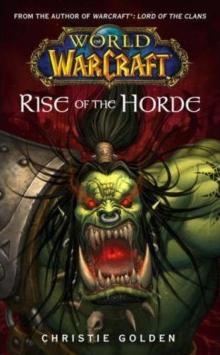 Rise of the Horde
Rise of the Horde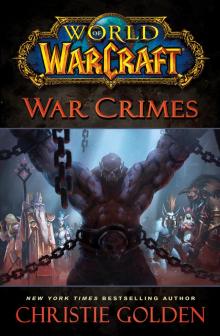 World of Warcraft: War Crimes
World of Warcraft: War Crimes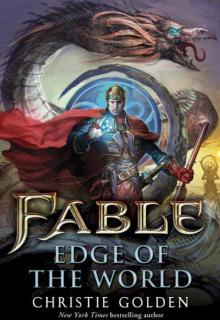 Fable: Edge of the World
Fable: Edge of the World Homecoming
Homecoming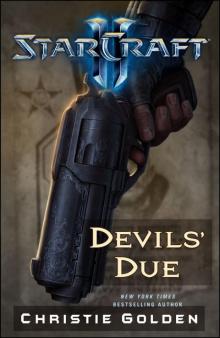 StarCraft II: Devil's Due
StarCraft II: Devil's Due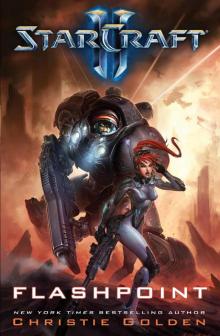 Starcraft II: Flashpoint
Starcraft II: Flashpoint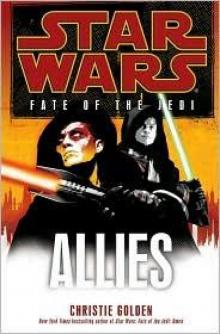 Allies
Allies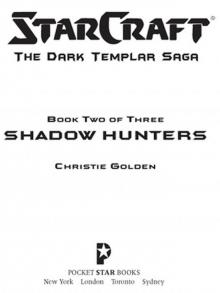 Shadow Hunters
Shadow Hunters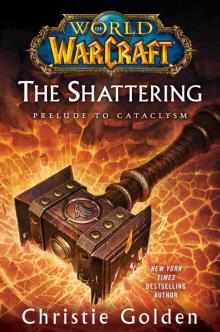 The Shattering: Prelude to Cataclysm wowct-1
The Shattering: Prelude to Cataclysm wowct-1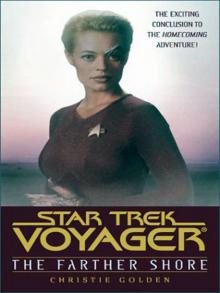 STAR TREK: VOY - Homecoming, Book Two - The Farther Shore
STAR TREK: VOY - Homecoming, Book Two - The Farther Shore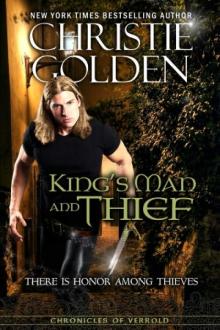 King's Man and Thief
King's Man and Thief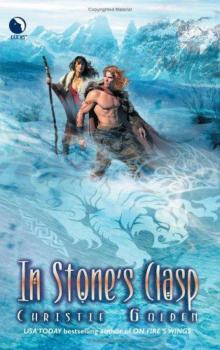 In Stone's Clasp
In Stone's Clasp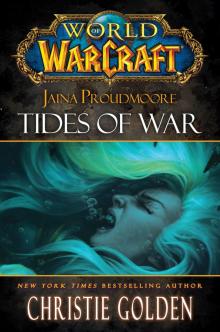 Jaina Proudmoore: Tides of War
Jaina Proudmoore: Tides of War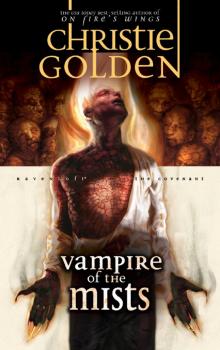 Vampire of the Mists
Vampire of the Mists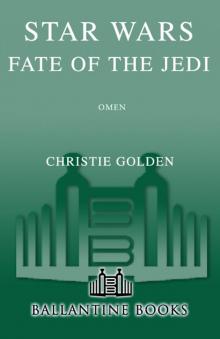 Star Wars: Fate of the Jedi II: Omen
Star Wars: Fate of the Jedi II: Omen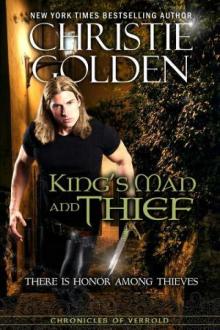 King's man and thief cov-2
King's man and thief cov-2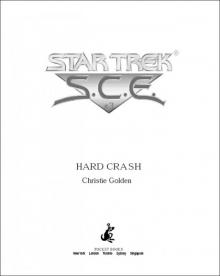 Star Trek
Star Trek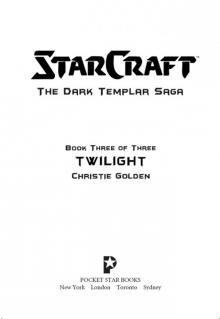 StarCraft: Dark Templar: Twilight
StarCraft: Dark Templar: Twilight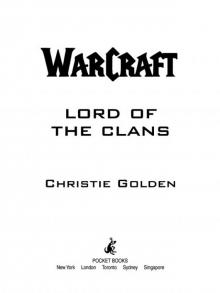 Lord Of The Clans
Lord Of The Clans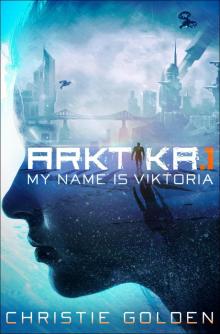 ARKTIKA.1 (Short Story)
ARKTIKA.1 (Short Story)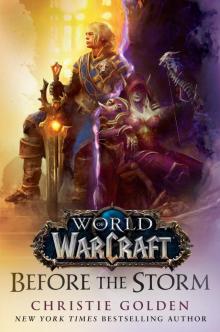 Before the Storm
Before the Storm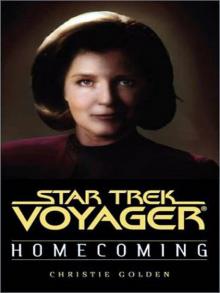 STAR TREK: VOY - Homecoming, Book One
STAR TREK: VOY - Homecoming, Book One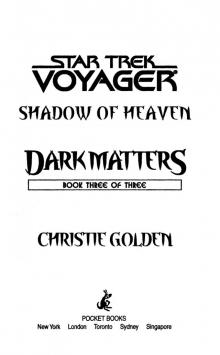 Shadow of Heaven
Shadow of Heaven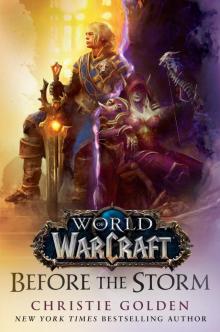 Before the Storm (World of Warcraft)
Before the Storm (World of Warcraft)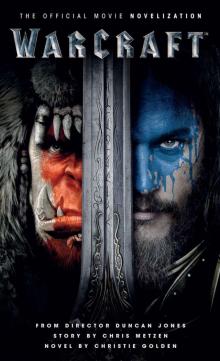 Warcraft Official Movie Novelization
Warcraft Official Movie Novelization Flashpoint
Flashpoint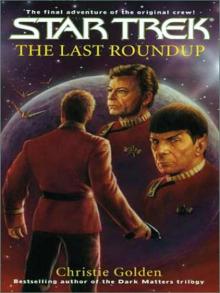 STAR TREK: The Original Series - The Last Roundup
STAR TREK: The Original Series - The Last Roundup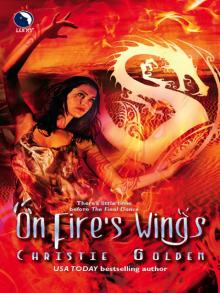 On Fire’s Wings
On Fire’s Wings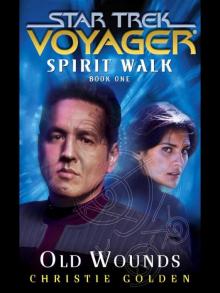 Spirit Walk, Book One
Spirit Walk, Book One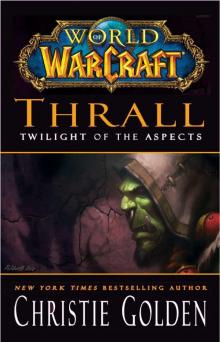 Thrall Twilight of the Aspects
Thrall Twilight of the Aspects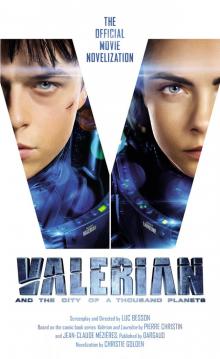 Valerian and the City of a Thousand Planets
Valerian and the City of a Thousand Planets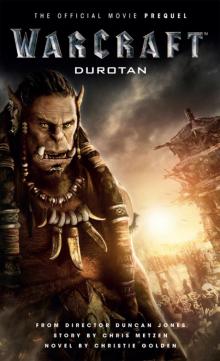 Warcraft
Warcraft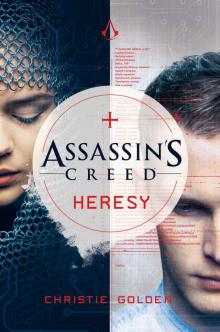 Assassin's Creed: Heresy
Assassin's Creed: Heresy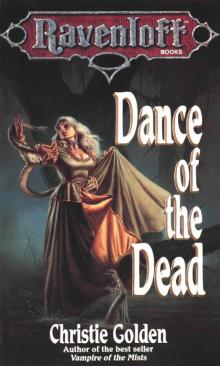 Dance of the Dead
Dance of the Dead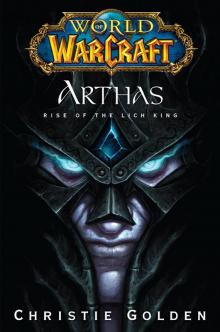 Arthas: Rise of the Lich King wow-6
Arthas: Rise of the Lich King wow-6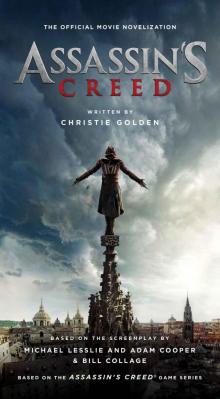 Assassin's Creed: The Official Movie Novelization
Assassin's Creed: The Official Movie Novelization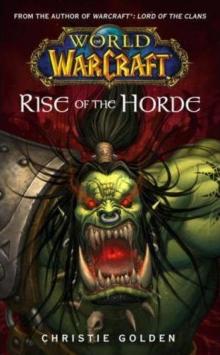 Rise of the Horde wow-2
Rise of the Horde wow-2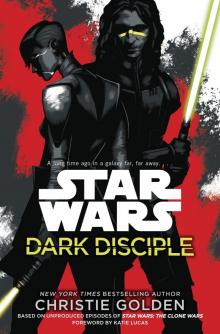 Dark Disciple
Dark Disciple Ghost Dance
Ghost Dance The Shattering
The Shattering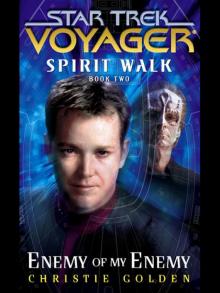 Spirit Walk, Book Two
Spirit Walk, Book Two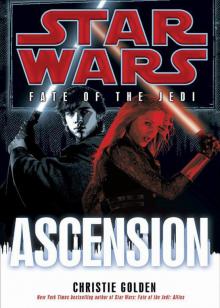 Star Wars: Fate of the Jedi: Ascension
Star Wars: Fate of the Jedi: Ascension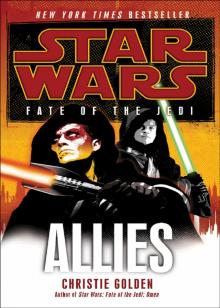 Star Wars: Fate of the Jedi V: Allies
Star Wars: Fate of the Jedi V: Allies The Enemy Within
The Enemy Within Kindred Spirits
Kindred Spirits The Farther Shore
The Farther Shore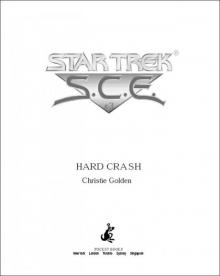 Star Trek: Hard Crash (Star Trek: Starfleet Corps of Engineers Book 3)
Star Trek: Hard Crash (Star Trek: Starfleet Corps of Engineers Book 3) Twilight
Twilight